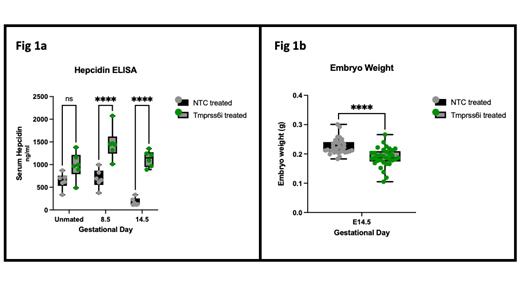Aim: Hepcidin levels are suppressed during human and murine pregnancy. It is unknown whether hepcidin levels are primarily the result of iron deficiency/utilisation or whether there is a pregnancy-specific mechanism for hepcidin suppression. We reasoned that Tmprss6 inhibition would cause constitutive BMP-SMAD signalling and help determine the mechanism of antenatal hepcidin suppression.
Method: Female wildtype C57BL/6 mice were treated subcutaneously every 21 days with a GalNAc-siRNA conjugate targeting Tmprss6 (Silence Therapeutics GmbH, Berlin, Germany) or a non-targeting control (NTC) siRNA conjugate. Mice were mated and monitored for pregnancy. Samples were collected from pregnant mice humanely euthanised at E8.5 or E14.5, and unmated controls.
Results: Treatment with Tmprss6 siRNA inhibited hepatic Tmprss6 mRNA expression (unmated fold change 0.077, p<0.0001).
qPCR Hamp expression was significantly increased in Tmprss6 siRNA-treated mice, compared to NTC-treated mice, at all timepoints. Serum hepcidin, by ELISA, was higher in Tmprss6 siRNA-treated mice than in NTC-treated mice at E14.5 (1126ng/ml vs 178.5, p<0.0001). In unmated mice, serum hepcidin was not significantly elevated (640.9 vs 980.1ng/ml, p=0.224).
Across NTC treated pregnancy, Hamp expression and serum hepcidin were reduced at E14.5 compared to unmated ( Hamp fold change E14.5 0.293, p=0.0367; serum hepcidin E14.5 178.5 vs 640.9, p=0.0247). In contrast, Tmprss6 siRNA treatment caused elevated hepcidin through pregnancy (E14.5 1126 vs unmated 980ng/ml, p=0.99); Fig 1a.
Maternal liver iron was unchanged between groups. Tmprss6 siRNA reduced placental iron, fetal liver iron, and fetal weight (0.189 vs 0.226g, p<0.0001), Fig 1b. At E8.5/E14.5, Tmprss6 siRNA reduced Mean Cell Volume (E14.5: 41.42 vs 51.72fL, p<0.0001) and Mean Cell Haemoglobin (E14.5: 11.20 vs 15.68pg, p<0.0001); at E14.5 only, maternal anaemia was seen with Tmprss6 siRNA (haemoglobin 9.4 vs 13.85g/L, p=0.0004).
Conclusion: Disruption of Tmprss6 increased hepcidin and ablated the hepcidin fall over pregnancy. This may suggest that any pregnancy-related factor which directly suppresses hepcidin cannot overcome Tmprss6 knockdown. Tmprss6 siRNA treatment resulted in iron-restricted erythropoiesis, reduced placental iron and impacted fetal development, despite unchanged liver iron stores.
Disclosures
Schaeper:Silence Therapeutics GmbH: Current Employment. Pasricha:ITL Biomedical: Consultancy; Vifor Pharmaceuticals: Consultancy, Other: Speaking Fees.


This feature is available to Subscribers Only
Sign In or Create an Account Close Modal